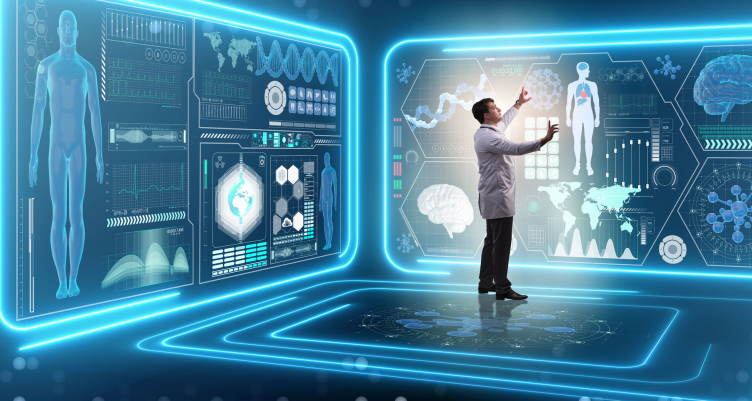How Artificial Intelligence is Shaping the Future of Humanity
Introduction
Artificial Intelligence (AI) is no longer a futuristic concept confined to science fiction. It has become an integral part of modern society, influencing industries, economies, and daily life. From healthcare to finance, transportation to entertainment, AI is revolutionizing the way humans interact with technology. As AI continues to evolve, its impact on humanity will be profound, raising questions about ethics, employment, and the balance between innovation and control. This article explores how AI is shaping the future of humanity and what lies ahead.

AI in Healthcare: Revolutionizing Medicine
One of the most significant contributions of AI is in the field of healthcare. AI-powered diagnostic tools are helping doctors detect diseases such as cancer and cardiovascular conditions earlier and more accurately. Machine learning algorithms analyze medical data at incredible speeds, assisting in personalized treatment plans and predictive analytics.
For instance, AI-driven systems like IBM Watson Health use vast datasets to recommend treatment options based on a patient’s medical history. Robotics in surgery, such as the Da Vinci surgical system, enhances precision and minimizes human error. AI chatbots and virtual assistants are also playing a role in mental health support, providing instant counseling services to those in need.
As AI advances, it promises to make healthcare more accessible, reducing costs and improving patient outcomes. However, challenges such as data privacy and the ethical implications of AI-driven medical decisions must be addressed.
AI in the Workplace: Transforming Jobs and Industries
AI is reshaping the workforce, automating repetitive tasks, and enhancing productivity across various sectors. While AI-driven automation increases efficiency, it also raises concerns about job displacement. Industries such as manufacturing, logistics, and customer service are witnessing a shift as AI-powered robots and chatbots handle routine operations.

However, AI is not merely replacing jobs; it is also creating new opportunities. The demand for AI specialists, data scientists, and cybersecurity experts is on the rise. AI-driven tools are also assisting employees by automating mundane tasks, allowing them to focus on creative and strategic aspects of their roles.
To adapt to this transformation, businesses and governments must invest in reskilling and upskilling programs. Education systems need to evolve, emphasizing digital literacy and critical thinking to prepare future generations for an AI-driven world.
AI in Everyday Life: Enhancing Convenience
AI is already embedded in our daily lives, often in ways we may not even notice. Virtual assistants like Siri, Alexa, and Google Assistant make everyday tasks more convenient. AI-driven recommendation algorithms on platforms like Netflix, Amazon, and Spotify personalize content and shopping experiences, enhancing user satisfaction.
Smart homes powered by AI can optimize energy consumption, security, and entertainment systems. AI-powered navigation tools help drivers find the fastest routes, reducing travel time and fuel consumption.
While AI-driven convenience is beneficial, it also raises concerns about data privacy and security. The vast amounts of personal data collected by AI systems must be safeguarded to prevent misuse and ensure user trust.
AI in Transportation: Paving the Way for Autonomous Vehicles
The transportation industry is undergoing a major transformation with the advent of AI-powered autonomous vehicles. Self-driving cars, such as those developed by Tesla, Waymo, and Uber, use AI algorithms to navigate roads, detect obstacles, and make real-time driving decisions.
AI-driven public transportation systems aim to reduce traffic congestion, lower carbon emissions, and improve road safety. AI-powered drones and autonomous delivery robots are revolutionizing logistics, making deliveries faster and more efficient.
However, widespread adoption of autonomous vehicles faces challenges, including regulatory hurdles, ethical dilemmas, and concerns about safety. The development of AI-driven transportation must ensure reliability and accountability to gain public acceptance.
AI in Ethics and Society: Addressing Challenges
As AI becomes more prevalent, ethical and societal concerns must be addressed. One of the primary challenges is bias in AI algorithms. Since AI learns from historical data, it can inherit biases present in human decision-making, leading to unfair treatment in areas such as hiring, lending, and law enforcement.
Another pressing issue is AI surveillance and data privacy. Governments and corporations increasingly use AI for facial recognition and predictive policing, raising concerns about privacy infringement and potential misuse.
AI ethics frameworks and regulations must be developed to ensure responsible AI usage. Transparency, accountability, and fairness should be prioritized to prevent AI from being misused or reinforcing social inequalities.
The Future of AI: Where Are We Headed?
Looking ahead, AI will continue to evolve, becoming more intelligent, efficient, and integrated into our daily lives. Some of the key developments on the horizon include:
- General AI: Unlike narrow AI, which specializes in specific tasks, General AI aims to mimic human intelligence and reasoning. If achieved, it could revolutionize every aspect of human life.
- AI in Space Exploration: AI-driven robots are already assisting in space missions. Future AI advancements could enhance deep-space exploration and autonomous decision-making for interplanetary missions.
- AI and Creativity: AI-generated art, music, and literature are becoming more sophisticated. AI may soon collaborate with humans in creative fields, pushing the boundaries of innovation.
- Human-AI Collaboration: Rather than replacing humans, AI is expected to work alongside them, enhancing problem-solving and decision-making processes.
Conclusion
AI is undeniably shaping the future of humanity, transforming industries, improving efficiency, and redefining human interaction with technology. While AI presents immense opportunities, it also comes with ethical and societal challenges that must be addressed. Striking a balance between innovation and responsible AI development is crucial for a future where AI enhances human well-being rather than posing risks.
As we navigate this AI-driven era, collaboration between governments, tech companies, and society will be essential to ensure AI is used for the greater good. The future of AI is both exciting and uncertain, but one thing is clear—it will continue to redefine what it means to be human in an increasingly intelligent world.

